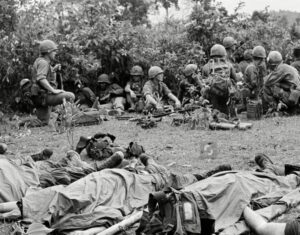 GOP presidential candidate Vivek Ramaswamy (photo, left) “wants to raise the voting age to 25 or require ‘civic duty’ stipulations for younger voters,” Mediaite reported on May 11, 2023 (read story here).
GOP presidential candidate Vivek Ramaswamy (photo, left) “wants to raise the voting age to 25 or require ‘civic duty’ stipulations for younger voters,” Mediaite reported on May 11, 2023 (read story here).
By that he means people between 18-25 either have to serve in the military, or as police or firefighters, or “pass the same civics test that an immigrant has to pass in order to become a naturalized citizen.”
He apparently believes voting is a privilege, not a right, and young people can’t be trusted to make wise voting decisions — unless they work in arbitrarily-designated occupations (or maybe he intends to dangle voting privileges as a reward for working in those occupations).
Ramswamy, 37, is one of 5 declared candidates for the 2024 GOP nomination. The others are Trump, Nikki Haley, Asa Hutchinson, and Larry Elder (details here). He has no chance of being elected president, so he’s probably running to get broader attention for his views.
Boy, am I going to have fun with this.
- I can name plenty of Republican politicians who couldn’t pass that test (see, e.g., my posting here).
- I can show you plenty of immature Republican voters over the age of 25 (see, e.g., video here).
- What’s magical about 25th birthdays? Why not 30th birthdays? Or 18th birthdays?
Changing the voting age would require amending the 26th Amendment, which he recognizes. Allowing some 18-year-olds to vote, but not others, depending on their occupation probably violates the equal protection clause of the 14th Amendment; he doesn’t address that.
It’s not surprising that Ramaswamy wants to disenfranchise young voters. His whole party does. His proposal seems especially targeted at depriving college students of voting rights, which is a Republican Party priority right now (see story here). Why? Because the youth vote was instrumental in Biden’s 2020 victory and the Democrats’ 2022 midterm wins (see story here).
The GOP is an unpopular minority party out of sync with a majority of Americans. Instead of trying to compete in elections by broadening their appeal to more voters, they’ve turned to a strategy of limiting voting rights, voter suppression, and trying to overturn election results.
The 26th Amendment was adopted in 1971. Until then, the voting age was 21 in most places. It was a response to the Vietnam War. Young people argued, “If you’re old enough to die in Vietnam, you’re old enough to vote.” (See photo below.) America agreed; the 26th Amendment, first proposed in 1968, was adopted faster than any other.
The Senate vote was 94-0 on March 10, 1971; the House vote was 401-19 on March 23, 1971. Five states (including Washington) ratified it that day, and the 38th state ratified it on July 1, 1971 (see details here).
Ramaswamy doesn’t understand this history, because he wasn’t born until 14 years later, and didn’t live through those times. Nor did he ever serve in the military, or work as a cop or firefighter, so if you apply his “logic,” why should he enjoy the privilege of voting just because he’s now over age 25? If voting is something that has to be earned, it’s hypocritical of him to demand that others earn it when he himself hasn’t.
These are flawed arguments, because of course he should be able to vote, because voting is a right not a privilege. But another aspect of this, which few people ever think of, is that beyond the question of the individual’s right to vote is the fact that a democracy needs voters, or you don’t have a democracy.
But getting back to Ramaswamy’s attack on the 18-year-old vote, which is rooted in the sacrifices our soldiers made in Vietnam, I’m a Vietnam veteran myself and here’s what I’d say to him, if I could:
“I didn’t serve to secure those rights just for my fellow soldiers, but for all Americans, and not only for my generation, but also for all future generations.”
And I would add that I’d never vote for someone who’d take those rights away.
